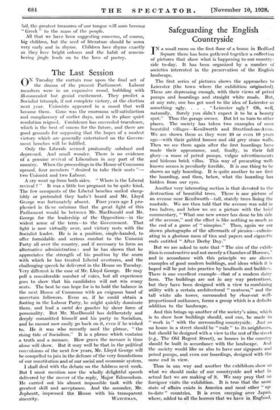The Last Session
ON Tuesday the curtain rose upon the final act of the drama of the present Parliament. Labour members were in an expansive mood, bubbling with ill-concealed but genial excitement. They predict a Socialist triumph, if not complete victory, at the election next year. Unionists appeared in a mood that well became them. Gone was the enormous self-satisfaction and complacency of earlier days, and in its place quiet resolution reigned. Confidence has succeeded truculence, which is the best of omens for the future, and there are good grounds for supposing that the hopes of a modest victory which are generally entertained on the Govern- ment benches will be fulfilled.
Only the Liberals seemed profoundly subdued and depressed. And small wonder. There is no evidence of a genuine revival of Liberalism in any part of the country. When the proceedings in the House of Commons opened, four members "desired to take their seats "- two Unionist and two Labour.
A cry went up from both sides. "Where is the Liberal revival ? " It was a little too pregnant to be quite kind.
The few occupants of the Liberal benches smiled sheep- ishly or pretended they hadn't heard and Mr. Lloyd George was fortunately absent. Four years ago I pro- phesied in th-tse columns that the great fight of this Parliament would be between Mr. MacDonald and Mr. George for the leadership of the• Opposition—in the widest sense of the term—to the Government. That fight is now virtually over, and victory rests with the Socialist leader. He is in a position, single-handed, to offer formidable and serious combat to the Unionist Party all over the country, and if necessary to form an alternative administration : and he has shown that he appreciates the strength of his position by the scorn with which he has treated Liberal overtures, and the challenging speech he delivered in the House on Tuesday.
Very different is the case of Mr. Lloyd George. Ile may poll a considerable number of votes, but all experience goes to show that his candidates will not win many seats. The best he can hope for is to hold the balance in the next House of Commons with an exiguous band of uncertain followers. Even so, if he could obtain a footing in the Labour Party, he might (quickly dominate them, and lead a cartel des gauches by sheer force of personality. But Mr. MacDonald has deliberately and deeply committed himself and his party to Socialism, and he cannot now easily go back on it, even if he wished to. He it was who recently used the phrase, "the rising tide of Socialism." It is a phrase which contains a truth and a menace. How grave the menace is time alone will show. But it may well be that in the political convulsions of the next few years, Mr. Lloyd George will be compelled to join in the defence of the very foundations of our constitution and of our social and economic system.
I shall deal with the debate on the Address. next week. But I Must mention now the wholly delightful speech delivered by the mover of the reply, Major Edmondson. He carried out his almost impossible task with the greatest skill and acceptance. And the seconder, Mr. ' Jepheott, impressed the House with his transparent












































 Previous page
Previous page